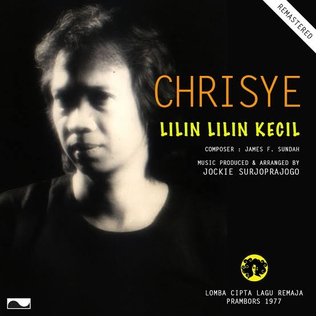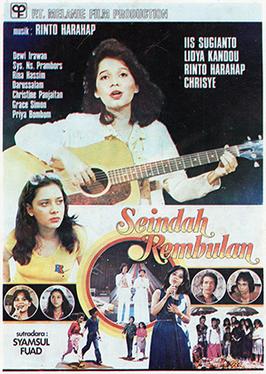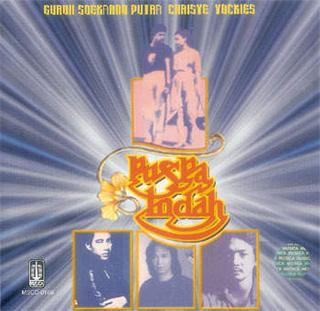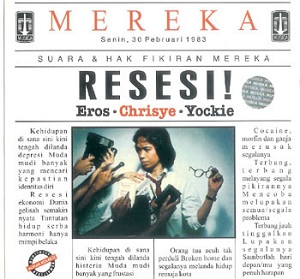
Hajji Chrismansyah Rahadi, born Christian Rahadi, better known by his stage name Chrisye, was an Indonesian progressive pop singer and songwriter. In 2011, Rolling Stone Indonesia declared him the third-greatest Indonesian musician of all time.

Badai Pasti Berlalu is the 1977 soundtrack to the Indonesian film of the same name. Rolling Stone Indonesia listed it as the best Indonesian album of all time. Three of its songs, Badai Pasti Berlalu, Merpati Putih, and Merepih Alam, were listed by Rolling Stone as among the best Indonesian songs ever released.

"Lilin-Lilin Kecil" is an Indonesian pop song written by James F. Sundah for the Prambors 1977 Teenage Song-Writing Competition and performed by Chrisye. To date it has been covered over fifty times. Rolling Stone Indonesia listed it as the thirteenth best Indonesian song of all time.

Sabda Alam is a 1978 Indonesian album released by Musica Studios. It is Chrisye's second studio album and his first after signing with Musica. The album was written in collaboration with Guruh Sukarnoputra. It was well received and, in 2007, was listed by Rolling Stone Indonesia as one of the 150 best Indonesian albums of all time. Actually, this album was scheduled to be released in August 1977, but it was officially released in early 1978.
"Indonesia Maharddhika" is a song by Indonesian progressive rock band Gipsy, consisting of Chrisye, Keenan Nasution, Oding Nasution, Roni Harahap, and Abadi Soesman, together with Guruh Sukarnoputra. It was released in 1976 on the album Guruh Gipsy with the names of its contributors hidden in the bilingual lyrics. In 2009, Rolling Stone Indonesia selected it as the 59th best Indonesian song of all time.

Erros Djarot is an Indonesian songwriter, director and politician. Beginning his music career with the soundtrack of Kawin Lari in 1976, Djarot became famous with the success of Badai Pasti Berlalu and its soundtrack album. In 1988, he directed Tjoet Nja' Dhien which received nine Citra Awards and was Indonesia's submission to the 62nd Academy Awards for the Academy Award for Best Foreign Language Film. In the late 1990s, Djarot entered politics, later forming the Bung Karno National Party in 2002.

Seindah Rembulan is a 1980 Indonesian film directed by Syamsul Fuad. It features Iis Sugianto, Sys NS, Chrisye, and Lydia Kandou in a story about a singer working to support her family. It spawned a soundtrack album.

Percik Pesona is a 1979 album by Indonesian singer Chrisye and is his third album and the second with Musica Studios. The album was received poorly, with Chrisye later reflecting that he had undergone second album syndrome.

Puspa Indah is a 1980 album by Indonesian singer Chrisye, working in collaboration with Guruh Soekarnoputra. It was his fourth studio album and the third with Musica Studios.
Jockie Soerjoprajogo was an Indonesian musician and songwriter. Jockie began his musical career while a junior high school student in Balikpapan, East Kalimantan. After working with bands in Jakarta and Surabaya, in 1973, he joined with Ahmad Albar, Donny Fattah and Ludwig Leeman to form God Bless; he would remain with this band intermittently until the 2000s. Jockie also worked with artists such as Chrisye and Iwan Fals, ultimately writing two songs—"Kehidupan" ("Life") and "Kesaksian" ("Witness")—that were listed by Rolling Stone Indonesia as among the best Indonesian songs of all time.

Ahmad Syech Albar or better known as Ahmad Albar is an Indonesian rock musician and vocalist of mixed ethnic Arabic and Javanese descent. He is the founding member of God Bless.
Vina Dewi Sastaviyana, better known by her stage name Vina Panduwinata, is an Indonesian singer, actress, and songwriter. The song "Kumpul Bocah" is cited as her signature song. Her song "Burung Camar" was listed by Rolling Stone Indonesia as the 28th-best Indonesian song of all time.

Addie Muljadi Sumaatmadja or better known as Addie MS is an Indonesian conductor, producer and composer of Sundanese and Javanese descent. He currently directs the Twilite Orchestra, which he founded in 1991.

Sendiri is a 1984 album by Indonesian singer Chrisye. It was his ninth studio album and eight with Musica Studios as well as his third album released in 1984 after Metropolitan and Nona (Miss).
Haryo Heroe Syswanto Ns. Soerio Soebagio, better known as Sys NS, was an Indonesian radio personality and politician.

Aku Cinta Dia is a 1985 pop album by the Indonesian singer Chrisye. It was his tenth studio album.

Pantulan Cita is a 1981 album by the Indonesian singer Chrisye. Recorded with much input from Jockie Soerjoprajogo, the album had rock influences and a cover design showing Chrisye's face as a puzzle. It was a critical and commercial failure, leading Chrisye to take a two-year sabbatical.

During his 40-year career, the Indonesian pop singer Chrisye (1949–2007) released 20 studio albums, 2 tribute or cover albums, 2 soundtrack albums, 10 compilation albums, an indie album, and 56 singles. He also recorded the soundtrack to three feature films, acted in two, and released 26 music videos. In 2008 Rolling Stone Indonesia listed five albums to which Chrisye contributed as among the best Indonesian albums of all time.

Resesi is a 1983 album by the Indonesian singer Chrisye. Recorded in collaboration with Jockie Soerjoprajogo and Eros Djarot after the latter's return from Germany, Resesi, which is Chrisye's sixth studio album, was inspired by the sound of The Police and featured songs influenced by CB radio and social criticism. It was a commercial hit upon release, selling 350,000 copies and being certified silver. In 2007 Rolling Stone Indonesia listed it as the 82nd best Indonesian album of all time.














